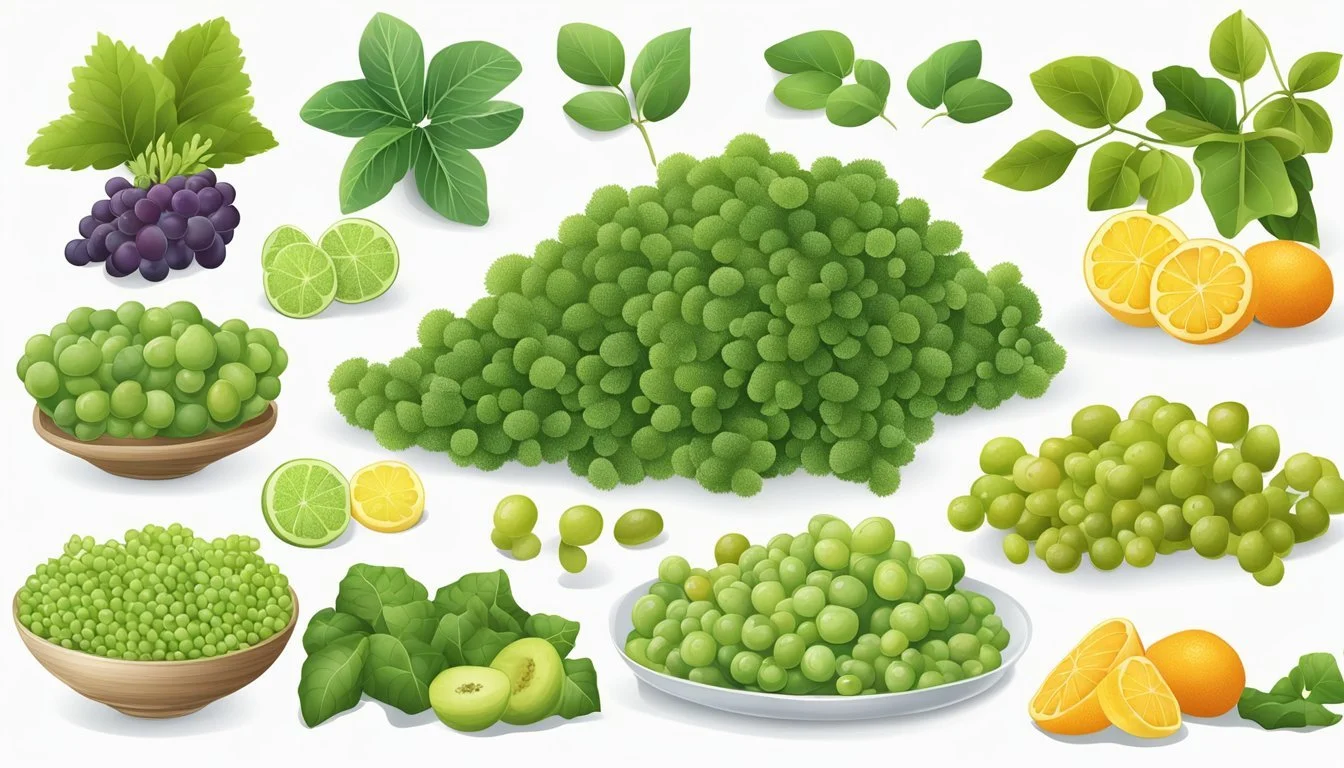What Are the Health Benefits of Sea Grapes?
Uncovering Nutritional Values
Sea grapes, also known as green caviar, are a unique type of seaweed that bears a striking resemblance to the familiar fruit it's nicknamed after. Scientifically known as Caulerpa lentillifera, these oceanic treasures are not only a delicacy in various coastal cuisines but also a powerhouse of nutrition. Enjoyed primarily in Asian countries, sea grapes have a crunchy texture and a fresh, slightly salty taste that complements their nutritional profile.
The health benefits of sea grapes are gaining attention due to their rich content of vitamins, minerals, and bioactive compounds. As a source of protein, sea grapes contain essential amino acids necessary for bodily functions. They are packed with minerals like phosphorus, calcium, and magnesium, which are critical for maintaining healthy bones and teeth. Additionally, these seaweeds offer a spectrum of vitamins, including A, C, E, and B vitamins such as thiamin, riboflavin, and niacin, supporting overall health from immune function to skin health.
Moreover, the presence of unsaturated fatty acids, particularly omega-3 fatty acids such as DHA and EPA, contributes to the myriad of health benefits attributed to sea grapes. These fatty acids are known to support heart health, improve memory, and maintain good eyesight. They also play a role in reducing inflammation and may have a positive impact on cholesterol levels, helping to prevent chronic diseases. With nutrition and health benefits seamlessly intertwined, sea grapes stand out as a promising addition to a balanced diet.
Nutritional Profile of Sea Grapes
Sea grapes boast a rich nutritional makeup, providing a unique combination of vitamins, minerals, and macronutrients that benefit human health. These edible seaweeds contain important unsaturated fatty acids and a spectrum of both macro and micronutrients that are essential to the diet.
Vitamins and Minerals Content
Sea grapes are an impressive source of various vitamins, including Vitamin A, Vitamin C, Vitamin E, and Vitamin K. Moreover, they are packed with B-vitamins such as thiamin, riboflavin, niacin, folate, and biotin. The mineral content is also noteworthy, featuring significant levels of calcium, magnesium, and potassium. Trace minerals such as iodine, vital for thyroid function, and copper, important for red blood cell formation, round out their nutritional profile.
Calcium: Essential for bone health and muscle function
Iron: Required for blood cell production and oxygen transport
Magnesium: Supports muscle and nerve function and energy production
Iodine: Critical for thyroid health
Potassium: Helps regulate fluid balance and blood pressure
Sodium: Necessary for nerve and muscle function
Copper: Important for iron metabolism and neurodevelopment
Macronutrients: Protein, Fat, and Carbohydrates
Sea grapes contain a balanced blend of macronutrients. They are a low-calorie option with a high protein content compared to other types of seaweed, contributing to muscle maintenance and growth. The fat present is primarily in the form of unsaturated fatty acids, including DHA, EPA, AA, ALA, and LA, known for their beneficial effects on heart health and cognitive functions. The carbohydrates found in sea grapes are mainly in the form of dietary fiber, which can aid digestion, and the presence of antioxidants contributes to the overall healthful properties of this marine food source.
Protein: Important for tissue repair and enzyme production
Unsaturated Fatty Acids: Supports cardiovascular health and cognitive functions
Dietary Fiber: Promotes digestive health and can help manage cholesterol levels
Health Benefits of Sea Grapes
Sea grapes, a type of seaweed, are increasingly recognized for their numerous health benefits, including their role in cardiovascular health, weight management, anti-inflammatory effects, as well as their positive impact on skin, hair, and bone health. Rich in vitamins, minerals, and antioxidants, sea grapes offer a versatile approach to boosting overall wellbeing.
Cardiovascular Health
Sea grapes contain high levels of unsaturated fatty acids such as DHA and EPA, which are vital for maintaining heart health. Regular consumption of these fatty acids contributes to lower cholesterol levels and may reduce the risk of heart disease. Additionally, sea grapes may assist in regulating blood pressure, which further supports cardiovascular function.
Supporting Weight Loss and Diabetes Management
The nutritional value of sea grapes can be beneficial in weight loss and diabetes management. Due to their low calorie but high fiber content, they help in creating a sense of fullness, thus potentially reducing overall caloric intake. The rich polysaccharides in sea grapes also play a role in the regulation of blood sugar levels, making them a thoughtful addition to a diabetes-conscious diet.
Anti-Inflammatory and Cancer Prevention
Sea grapes exhibit anti-inflammatory properties, which can be instrumental for individuals with arthritis and other inflammatory conditions. The antioxidants present in sea grapes combat free radicals that can cause oxidative stress and lead to cancer. Therefore, incorporating sea grapes into the diet may be a preventative measure against certain types of cancer.
Skin, Hair, and Bone Health
This seaweed's rich content of vitamin C is essential for the production of collagen, which promotes healthy skin and hair. Eating sea grapes might help in reducing the appearance of age spots and maintaining an even skin tone. High levels of calcium found in sea grapes contribute to bone health, making them an excellent choice for strengthening bones and joints.
Digestive and Immune System Support
Sea grapes include compounds that are beneficial for gut health, aiding in digestion and potentially improving the function of the immune system. They do this by enhancing the body’s production of white blood cells, which are pivotal in defending the body against infections. The nutritional profile of sea grapes can establish a firm base for developing a strong and responsive immune system.
Culinary Uses and Preparation
Sea grapes, with their unique taste and low calorie content, have grown popular in Japanese cuisine and beyond. They offer a salty, yet refreshing flavor that enhances various dishes, ranging from salads (What wine goes well with salads?) to sushi.
Incorporating Sea Grapes into Recipes
One can find sea grapes adding a burst of the ocean's essence to many Japanese and Philippine dishes. They are particularly celebrated in:
Salads: Sea grapes contribute a crunchy texture and a hint of saltiness, offering a fresh contrast to the salad's greens.
Sushi and Sashimi: As a garnish, their unique texture and saline taste complement the delicate flavors of raw fish.
Japanese side dishes: Often served with a simple dipping sauce of soy sauce and vinegar, sea grapes can be a standalone side dish.
Here are specific recipes where sea grapes shine:
Sea Grape Salad:
Mix sea grapes with sliced cucumbers and dressing.
Dressing: Combine rice vinegar, soy sauce, a hint of sugar, and sesame oil.
Sea Grape Sushi:
Use sea grapes as a topping for nigiri or include them in rolls for an added pop of flavor.
Preparation Techniques for Optimal Nutrient Retention
To retain the nutritional value of sea grapes, proper preparation is essential. These techniques ensure that the health benefits are not compromised:
Cold Soaking: Rinse with cold water to maintain firmness and nutrient integrity.
Brief Blanching: If softening is desired, a quick blanch in boiling water followed by an ice bath can preserve nutrients while achieving the desired texture.
By following these methods, the sea grapes remain a healthful addition to any culinary creation.
Cultivation and Sustainability
Sea grapes, scientifically known as Caulerpa lentillifera, are seaweed species predominantly cultivated in tropical regions, including Southeast Asia and parts of the Caribbean. Their cultivation is an integral part of the marine aquaculture industry, focused on sustainability and minimal environmental impact.
Cultivation Practices: Growers typically utilize shallow, sea water ponds or in-land tanks, providing controlled conditions that promote the plant's growth. This method allows for regular harvesting without depleting wild populations.
Eco-friendly Harvesting: The harvesting process aims to be non-invasive, ensuring the stability of marine ecosystems. Sea grapes can regrow from the remaining structures, thus enabling continual production.
In considering the organic facts about sea grapes, they are often grown without the use of synthetic fertilizers or pesticides. It aligns with the increasing consumer demand for organic products.
Caulerpa lentillifera is sometimes confused with Coccoloba uvifera, commonly known as sea grape. However, Coccoloba uvifera is a separate species of flowering plants that produce edible fruits, and it is not used in the same aquaculture context.
Cultivation of sea grapes not only provides a sustainable food source but also contributes to coastal protection and biodiversity. The root structures of sea grapes can help stabilize substrates, providing habitats for various marine organisms and thus enhancing biodiversity within the cultivation sites.
Frequently Asked Questions
In this section, dedicated readers can find direct answers to common inquiries regarding the nutritional and health benefits of sea grapes.
What are the nutritional benefits of incorporating sea grapes into my diet?
Sea grapes are rich in vital nutrients including unsaturated fatty acids like DHA and EPA, which support vision and cognitive function. They also offer calcium and iron, essential for bone strength and oxygen transport in the blood.
Can sea grapes have any adverse effects on health?
Generally considered safe for consumption, sea grapes do not commonly cause adverse effects. However, as with any food, there may be a risk of allergy or sensitivity for some individuals, and moderation is important.
How can sea grapes improve skin health?
The high vitamin C content in sea grapes contributes to a more even skin tone and might reduce the appearance of age spots. Their anti-inflammatory properties are beneficial in soothing irritated skin, making them suitable for sensitive or acne-prone skin types.
What makes sea grapes be considered a superfood?
Sea grapes boast a combination of antioxidants, vitamins, and minerals that contribute to their classification as a superfood. They are prized for their potential in preventing and managing health issues like heart disease and high cholesterol.
What are some important facts to know about sea grapes?
Important to note, sea grapes contain polyunsaturated acids and protein, which can help reduce inflammation and the symptoms of arthritis. Additionally, their fatty acids are linked with improved eyesight and memory.
What is the best way to consume sea grapes for their health benefits?
To maximize their health benefits, sea grapes can be eaten raw or included in salads and other dishes. The bioavailability of their nutrients is highest when consumed fresh, maintaining their unique texture and nutritional profile.





